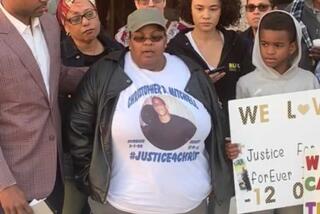Mug Shot Decision Flies in Face of Justice
- Share via
California’s top prosecutor just approved violating our due-process rights, but don’t be surprised that you didn’t hear about it.
Newspapers such as this one are the direct beneficiaries of Atty. Gen. Bill Lockyer’s wrong-headed decision.
Recently, the sheriff of Contra Costa County in Northern California requested an official ruling from the state attorney general on the following question: May law enforcement officials give journalists copies of a criminal suspect’s booking photograph?
Lockyer should have said no. He is sworn to protect all Californians, especially those accused of crimes.
Instead, in Attorney General Opinion No. 03-205 issued last week, Lockyer allows police, district attorneys and sheriffs to release mug shots of defendants at their discretion, giving clear license to a practice that the Los Angeles Police Department, the Los Angeles County district attorney’s office, the federal Justice Department and almost all other law enforcement offices frown upon. (One exception: Old mug shots are publicized to help catch suspects on the lam.)
Mug shots are more than just embarrassing photos. They are potentially prejudicial pieces of evidence.
When I was a prosecutor, I often tried to figure out a way -- any way -- to introduce mug shots at trial. I might argue that the photo proved that a defendant had altered his appearance to avoid detection or was wearing clothing that matched an eyewitness’ description.
But in reality, mug shots were simply devastating to the defense. Lawyers can gussy up defendants for trial, but the accused rarely look their best on the day of their arrest. Indeed, most of them look bedraggled, desperate and utterly guilty, regardless of the facts.
Many judges know this and are reluctant to admit booking photos into evidence precisely because their prejudicial impact so substantially outweighs their value as evidence. After all, the law says that merely being booked does not remove the presumption of innocence. But jurors have a tough time keeping that in mind when looking at a photo that would make anyone appear guilty.
Lockyer must know that the state bar prohibits attorneys from making statements or releasing information that might unduly color the opinions of potential jurors. Prosecutors are specifically bound to refrain from leaking information that could violate a defendant’s constitutional right to a fair trial.
Releasing any evidence before trial -- ballistics reports, autopsy photographs, incriminating statements -- is improper and, potentially, grounds for reversing subsequent convictions.
In the modern media age, mug shots are especially dangerous.
Conventional wisdom may put the value of a picture at a thousand words, but to journalists, mug shots are worth considerably more.
Nick Nolte’s movies may bomb at the box office, but his leaked September DUI booking photo, wide-eyed and wild-haired, was a bona fide hit on tabloid television.
The public loves to see the high and mighty brought low, celebrities caught, deliciously, in dazed humiliation, full face and profile. Hugh Grant, chagrined after his arrest for soliciting a prostitute. Kobe Bryant, having turned himself in to face sexual assault charges.
Do we assume they’re guilty? That seems, if not undeniable, then at least probable.
Lockyer’s short opinion doesn’t even consider the prejudicial impact on the rights of the accused. Instead, it uses a perfunctory explanation of the media’s general access to public documents to justify what is neither just nor fair.
The Constitution speaks of public trials, not public police investigations. The public’s right to know what is going on in a criminal case is not absolute. It can be limited to protect law enforcement interests and must, by law, be limited to ensure that defendants get fair trials.
In our 24/7 news cycle, where pictures and sound bites can bounce endlessly around the world, releasing a mug shot may titillate, but it serves no purpose. The public has a right to be informed. It does not have the right to be entertained. What someone looked like at the time of his arrest isn’t meaningful information. But it certainly threatens to undermine the accused and the public’s interest in a fair trial.
Perhaps it is worth noting that Lockyer, a probable candidate for governor one day and no less ambitious than any politician who has amassed a multimillion-dollar campaign war chest, issued his opinion quietly. This is odd. Lockyer manages to keep a full-time press office employed churning out laudatory releases extolling most of his work.
Perhaps he’s not terribly proud of what he has done.
More to Read
Sign up for Essential California
The most important California stories and recommendations in your inbox every morning.
You may occasionally receive promotional content from the Los Angeles Times.










